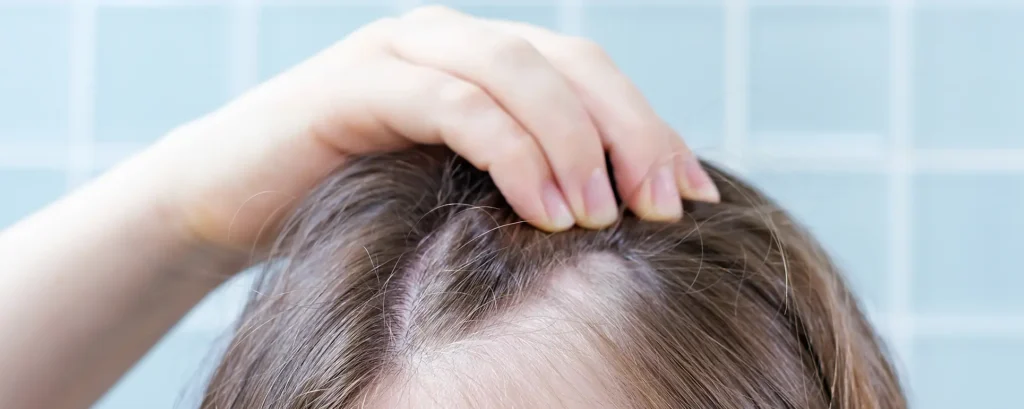If you’ve been losing more hair than usual, you’re definitely not alone. Hair loss can be incredibly stressful, and when it starts happening suddenly or more noticeably, it’s natural to wonder whether it might be due to a vitamin deficiency. After all, the internet is overflowing with supplement suggestions biotin, iron, vitamin D, zinc, B12, folate and dozens more. But the truth is that not every nutrient plays an essential role in hair growth, and not every supplement is worth taking.
In this guide, I want to walk you through the nutrients that genuinely matter for hair health, how to know if a deficiency is the cause of your alopecia, when blood tests are necessary, and what dermatologists actually do to treat hair loss linked to low vitamin levels. My goal is to help you cut through the noise so you can make informed decisions based on real science, not marketing claims.
But before we dive deeper, it’s important to understand that vitamin-related hair loss rarely happens overnight. Deficiencies usually build up slowly over months or even years, quietly affecting your energy levels, skin, nails and overall health long before you notice changes in your hair. That’s why many people overlook the early signs or confuse them with stress or seasonal shedding. By the time hair thinning becomes visible, your body has often been struggling for a while which makes timely testing and proper treatment even more important.
Can Vitamin Deficiencies Really Cause Alopecia?
Yes, certain deficiencies can directly contribute to hair thinning, shedding or slower regrowth. But not all deficiencies cause visible hair loss, and some supplements do absolutely nothing unless you’re actually deficient.
Hair follicles are among the fastest-growing cells in your body. To sustain this rapid growth, they rely on a constant supply of vitamins, minerals and nutrients. When something is missing especially iron, vitamin D, B12 or zinc the growth cycle weakens, and more hairs shift into the shedding phase.
However, vitamin deficiency is only one possible cause of alopecia. Genetics, hormones, inflammation, stress and autoimmune conditions can also be responsible. That’s why proper testing is so important before assuming supplements will fix the problem.
Which Nutrients Really Matter for Hair Growth?

Let’s break down the vitamins and minerals that have strong scientific evidence supporting their role in hair health.
1. Iron: One of the Most Common Deficiencies Linked to Hair Loss
If there’s one nutrient strongly connected to hair shedding, it’s iron especially in women.
Iron deficiency, with or without anaemia, can disrupt the hair growth cycle because your follicles need oxygen to grow. When your iron levels drop, your body prioritises essential organs first, and your hair is the first thing to be affected.
Symptoms of iron deficiency-related hair loss:
- Increased daily shedding
- Diffuse thinning across the scalp
- Slow regrowth
- Brittle hair
- Fatigue, dizziness or cold hands
You can’t guess your iron stores. You need a ferritin blood test, which measures stored iron not just circulating iron.
Ideal ferritin levels for hair growth:
Many dermatologists recommend a ferritin level of 70 ng/mL or higher for healthy hair cycling.
If your ferritin is low, supplements can help but only under medical guidance.
2. Vitamin D: Essential for Follicle Cycling
Vitamin D plays a direct role in hair follicle function. Low levels are strongly associated with:
- Telogen effluvium (excessive shedding)
- Alopecia areata
- Slower regrowth
Since many people have low vitamin D levels especially in winter it’s a very common factor in unexplained hair thinning.
Symptoms may include:
- Diffuse shedding
- Slow growth
- Mood changes
- Low immunity
A simple blood test can confirm deficiency. Most people need supplementation, but the dosage depends on your test results.
3. Vitamin B12: Essential for Red Blood Cell Production
Vitamin B12 helps your body make red blood cells, which carry oxygen to your scalp and follicles. Low B12 slows hair cycling and can trigger shedding.
Symptoms of B12 deficiency hair loss:
- Sudden shedding
- Fatigue
- Pale skin
- Tingling hands or feet
- Weakness or shortness of breath
B12 deficiency is more common in:
- Vegans and vegetarians
- People with gut conditions
- People with low intrinsic factor
Testing B12 levels is essential before supplementation.
4. Zinc: Crucial for Follicle Repair and Strength
Zinc supports follicle repair, cell division and protein synthesis. Deficiency weakens hair structure and causes shedding.
Signs of zinc-related hair loss:
- Diffuse thinning
- Slow wound healing
- Dry flaky scalp
- Brittle hair
Too much zinc can actually cause hair loss, so accurate testing is essential.
5. Folate (Vitamin B9): Supports Cell Turnover
Hair follicles depend on rapid cell turnover. Folate deficiency slows this process, leading to thinning and weaker hair strands.
This deficiency often appears alongside B12 deficiency.
6. Biotin: Overrated, Except for a True Deficiency
Biotin is heavily marketed for hair, but here’s the truth:
Biotin deficiency is extremely rare.
Unless you’re pregnant, have a genetic condition, or take certain medications, you probably don’t need biotin supplements. Excessive biotin can also interfere with thyroid and heart tests, so supplementation should be supervised.
7. Protein: Essential for Hair Structure
Your hair is made mostly of a protein called keratin. If you’re not eating enough protein, your follicles won’t have the building blocks they need.
This is especially common in people on restrictive diets.
8. Omega-3 Fats: Support Scalp Health
Omega-3 fats help regulate scalp inflammation and dryness. While they don’t directly stimulate growth, they create a healthier environment for follicles.
Do Multivitamins Help Alopecia?

Multivitamins can fill small gaps in your diet, but they won’t reverse hair loss unless a specific deficiency is the cause.
The problem is that many people assume supplements are harmless. But taking unnecessary vitamins:
- Won’t fix the cause
- Can delay proper diagnosis
- Can lead to overdose (especially zinc, vitamin A and selenium)
This is why dermatologists focus on testing, not guessing.
When Should You Get Blood Tests for Hair Loss?
If you’ve been shedding hair for longer than eight weeks, it’s worth getting tested.
Your dermatologist may check:
- Ferritin (iron stores)
- Vitamin D
- Vitamin B12
- Folate
- Zinc
- Thyroid function
- Full blood count
These tests reveal whether a deficiency or something else is driving your alopecia.
Types of Hair Loss Caused by Vitamin Deficiencies
Not all alopecia looks the same. Different deficiencies cause different patterns.
1. Telogen Effluvium
This is the most common form of deficiency-related hair loss.
It causes diffuse shedding all over the scalp.
Low:
- Iron
- Vitamin D
- B12
- Zinc
can all trigger telogen effluvium.
2. Alopecia Areata (Autoimmune)
Vitamin deficiencies don’t cause alopecia areata, but low vitamin D and zinc can make it more active or harder to control.
3. Hair Shaft Fragility
Low protein, zinc or iron weakens hair fibre strength, causing breakage rather than shedding.
How Dermatologists Treat Vitamin-Deficiency Alopecia
Treatment is targeted and based on test results not guesswork.
1. Correcting the Deficiency Safely
Your dermatologist will recommend supplements tailored to your results.
Iron deficiency treatment may include:
- Iron supplements
- Dietary changes
- Treating underlying causes (heavy periods, gut issues)
Vitamin D deficiency treatment may include:
- High-dose weekly vitamin D
- Daily maintenance dosing
B12 deficiency treatment may include:
- Oral B12
- Sublingual B12
- Injections for severe deficiency
Zinc or folate deficiencies are treated similarly, always at doses based on your lab results.
2. Treating Hair Loss Directly
Correcting a deficiency may take months to show improvement.
During that time, your dermatologist may also recommend:
- Minoxidil
- PRP therapy
- Low-level laser therapy
- Anti-inflammatory treatments
- Hair-strengthening plans
This combination approach helps you see improvement sooner.
When Will You See Regrowth After Correcting a Deficiency?
Hair growth takes time.
Typical regrowth timeline:
- Month 1–2: shedding slows
- Month 3–4: early regrowth
- Month 6–9: noticeable improvement
- Month 12: strong recovery
The key is consistency and proper medical treatment.
Can You Treat Vitamin-Deficiency Alopecia at Home?
You can support your scalp by:
- Eating a nutrient-rich diet
- Reducing stress
- Sleeping well
- Avoiding harsh styling
- Using gentle hair products
But supplements alone rarely fix the problem unless you know exactly what’s missing.
That’s why testing is essential.
Diet for Healthy Hair Growth (Backed by Science)
Your diet plays a big role in preventing deficiency-related hair loss.
Include:
- Lean protein
- Leafy greens
- Beans and lentils
- Eggs
- Fish
- Nuts and seeds
- Whole grains
- Citrus fruits
These foods provide the core nutrients your follicles need.
FAQs:
1. Can a vitamin deficiency really cause noticeable hair loss?
Yes, certain vitamin and mineral deficiencies can directly lead to hair thinning, increased shedding and slower regrowth. Your hair follicles are extremely active structures that depend on a continuous supply of nutrients. When levels of iron, vitamin D, zinc or B12 fall, the follicle shifts into the resting or shedding phase. This reduces the number of strands actively growing and gradually leads to visible thinning. However, deficiencies are only one possible reason; factors like hormones, stress, genetics and autoimmune conditions can also contribute. That’s why proper diagnosis is essential before starting supplements.
2. Which deficiency is most commonly linked to sudden hair shedding?
Iron deficiency is by far the most common nutritional cause of sudden diffuse hair shedding, especially in women. Even without anaemia, low ferritin can disrupt hair cycling. When iron stores are low, the body channelises oxygen to vital organs instead of follicles. As a result, hair strands enter the shedding phase earlier than they should, leading to a sudden increase in hair fall.
3. How do I know if vitamin deficiency is behind my hair loss?
The only reliable way to confirm a deficiency is through blood tests. Symptoms like fatigue, brittle hair, pale skin or tingling hands may give clues, but they aren’t enough to diagnose the cause. A dermatologist may recommend checking ferritin, vitamin D, B12, zinc and folate levels along with thyroid function and a full blood count. These tests reveal whether a deficiency is genuinely affecting your hair follicles.
4. Can taking a multivitamin stop hair loss?
A multivitamin can support general health but won’t reverse alopecia unless a specific deficiency is actually present. Hair loss caused by thyroid issues, androgenetic alopecia, hormones or autoimmune triggers will not respond to a multivitamin. In some cases, unnecessary supplements may even cause harm, such as zinc overload or excessive vitamin A, which itself can cause hair shedding. Dermatologists advise treating deficiencies based on lab results, not guesswork.
5. How long does it take to see regrowth after correcting a deficiency?
Hair growth is a slow process, so improvements take time. Shedding usually reduces within the first eight weeks after correcting the deficiency. Early regrowth becomes visible around three to four months. Noticeable thickening takes six to nine months, and full recovery may take up to a year. The timeline varies depending on how long the deficiency existed and whether other factors, such as stress or hormonal imbalances, are also involved.
6. Does vitamin D deficiency cause specific types of alopecia?
Low vitamin D is strongly associated with telogen effluvium, a condition in which the hair shifts prematurely into the shedding phase. It is also linked with autoimmune conditions like alopecia areata, where deficiency may make flare-ups more frequent or harder to control. Vitamin D plays a crucial role in follicle cycling, so low levels can weaken the growth phase and delay regrowth.
7. Is biotin actually useful for treating hair loss?
Biotin only helps in rare cases where a true deficiency exists. Most people have adequate biotin levels from their regular diet. Unless you have a genetic disorder, take certain medications or are pregnant, biotin deficiency is unlikely. Overuse of biotin supplements can even interfere with thyroid, heart and hormone blood tests. Dermatologists rarely recommend it unless bloodwork suggests a deficiency or the patient has brittle nail–hair syndrome.
8. How do dermatologists treat vitamin-deficiency alopecia?
Treatment focuses on correcting the specific deficiency safely and gradually restoring the follicle cycle. Iron deficiency is treated with prescribed supplements and dietary changes, often alongside management of underlying causes such as heavy periods. Vitamin D may require high-dose weekly therapy, while B12 deficiency is managed with oral or injectable forms depending on severity. In addition to correcting the deficiency, dermatologists may also use treatments like minoxidil, PRP, low-level laser therapy or anti-inflammatory approaches to speed up recovery and improve density while the follicles heal.
9. Can vitamin deficiencies cause patchy hair loss?
Patchy hair loss is more commonly linked to autoimmune conditions like alopecia areata. While deficiencies don’t directly cause bald patches, low vitamin D and zinc may worsen autoimmune activity or slow recovery. Deficiencies typically cause diffuse thinning across the scalp rather than circular bald patches. If patchy loss occurs, an evaluation for autoimmune causes is essential.
10. Can improving my diet alone reverse deficiency-related hair loss?
A nutrient-rich diet supports overall hair health, but diet alone may not be enough to correct a significant deficiency. For example, restoring iron levels through food can take a long time if ferritin is very low. Similarly, vitamin D deficiency often requires prescribed supplements because dietary sources are limited. Diet is an important long-term strategy, but medical treatment based on blood test results is usually needed for full hair recovery.
Final Thought: Your Path to Healthier, Stronger Hair
Vitamin-deficiency alopecia can feel confusing and overwhelming, especially when so many supplements claim to be the “magic fix.” The truth is that your hair needs the right nutrients in the right amounts and the only way to know what’s truly missing is through proper testing and expert guidance. Once a deficiency is identified and corrected, most people see steady improvement in shedding, strength and overall density, but patience is key because hair growth happens slowly.
If you want personalised support or you’re unsure whether a deficiency is behind your symptoms, booking an assessment is the best next step. And if you’re looking for alopecia treatment in London, you can contact us at the London Dermatology Centre to schedule a consultation with one of our specialists.
References:
1. Gerkowicz, A., Chyl-Surdacka, K., Krasowska, D. & Chodorowska, G., 2017. The Role of Vitamin D in Non-Scarring Alopecia. International Journal of Molecular Sciences, 18(12), p.2653. https://www.mdpi.com/1422-0067/18/12/2653
2. Peterle, L., Sanfilippo, S., Borgia, F., Cicero, N. & Gangemi, S., 2023. Alopecia Areata: A Review of the Role of Oxidative Stress, Possible Biomarkers, and Potential Novel Therapeutic Approaches. Antioxidants, 12(1), p.135. https://www.mdpi.com/2076-3921/12/1/135
3. Alamoudi, R., et al., 2021. Association Between Vitamin D and Zinc Levels With Alopecia Areata Phenotypes at a Tertiary Care Center. Journal of Dermatology. https://pubmed.ncbi.nlm.nih.gov/34079683/
4. Yongpisarn, T., Tejapira, A., Thadanipon, K. & Suchonwanit, P., 2024. Vitamin D deficiency in non-scarring and scarring alopecias: a systematic review and meta-analysis. https://pubmed.ncbi.nlm.nih.gov/39416654/
5. Hampshire, R., et al., The role of micronutrients in alopecia areata: A Review. https://pmc.ncbi.nlm.nih.gov/articles/PMC5685931/
